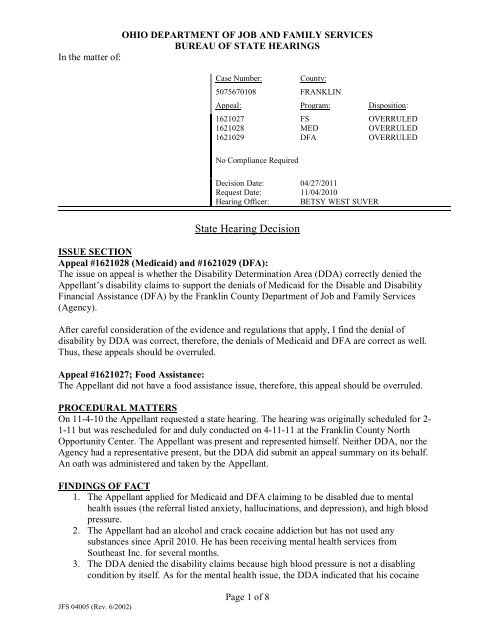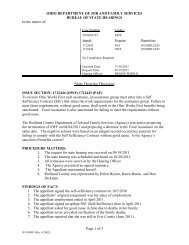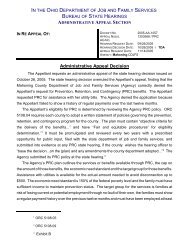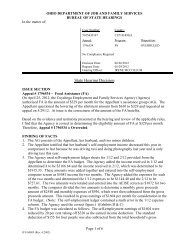State Hearing Decision - Hearing Decisions and Administrative ...
State Hearing Decision - Hearing Decisions and Administrative ...
State Hearing Decision - Hearing Decisions and Administrative ...
Create successful ePaper yourself
Turn your PDF publications into a flip-book with our unique Google optimized e-Paper software.
OHIO DEPARTMENT OF JOB AND FAMILY SERVICES<br />
BUREAU OF STATE HEARINGS<br />
In the matter of:<br />
JFS 04005 (Rev. 6/2002)<br />
Case Number: County:<br />
5075670108 FRANKLIN<br />
Appeal: Program: Disposition:<br />
1621027<br />
FS<br />
OVERRULED<br />
1621028<br />
MED<br />
OVERRULED<br />
1621029<br />
DFA<br />
OVERRULED<br />
No Compliance Required<br />
<strong>Decision</strong> Date:<br />
Request Date:<br />
<strong>Hearing</strong> Officer:<br />
<strong>State</strong> <strong>Hearing</strong> <strong>Decision</strong><br />
Page 1 of 8<br />
04/27/2011<br />
11/04/2010<br />
BETSY WEST SUVER<br />
ISSUE SECTION<br />
Appeal #1621028 (Medicaid) <strong>and</strong> #1621029 (DFA):<br />
The issue on appeal is whether the Disability Determination Area (DDA) correctly denied the<br />
Appellant’s disability claims to support the denials of Medicaid for the Disable <strong>and</strong> Disability<br />
Financial Assistance (DFA) by the Franklin County Department of Job <strong>and</strong> Family Services<br />
(Agency).<br />
After careful consideration of the evidence <strong>and</strong> regulations that apply, I find the denial of<br />
disability by DDA was correct, therefore, the denials of Medicaid <strong>and</strong> DFA are correct as well.<br />
Thus, these appeals should be overruled.<br />
Appeal #1621027; Food Assistance:<br />
The Appellant did not have a food assistance issue, therefore, this appeal should be overruled.<br />
PROCEDURAL MATTERS<br />
On 11-4-10 the Appellant requested a state hearing. The hearing was originally scheduled for 2-<br />
1-11 but was rescheduled for <strong>and</strong> duly conducted on 4-11-11 at the Franklin County North<br />
Opportunity Center. The Appellant was present <strong>and</strong> represented himself. Neither DDA, nor the<br />
Agency had a representative present, but the DDA did submit an appeal summary on its behalf.<br />
An oath was administered <strong>and</strong> taken by the Appellant.<br />
FINDINGS OF FACT<br />
1. The Appellant applied for Medicaid <strong>and</strong> DFA claiming to be disabled due to mental<br />
health issues (the referral listed anxiety, hallucinations, <strong>and</strong> depression), <strong>and</strong> high blood<br />
pressure.<br />
2. The Appellant had an alcohol <strong>and</strong> crack cocaine addiction but has not used any<br />
substances since April 2010. He has been receiving mental health services from<br />
Southeast Inc. for several months.<br />
3. The DDA denied the disability claims because high blood pressure is not a disabling<br />
condition by itself. As for the mental health issue, the DDA indicated that his cocaine
STATE HEARING DECISION CONTINUATION<br />
addition is in early full remission, <strong>and</strong> the substance-induced mood <strong>and</strong> psychotic<br />
disorders were also in remission. DDA compared the conditions to social security listing<br />
12.08 (personality disorders) <strong>and</strong> 12.09 (substance addiction disorders). DDA found he<br />
did not meet the criteria for either listing, then determined his residual functional<br />
capacity. It found that with his mental health issues he could still do some light work in<br />
the national economy such as janitorial work after hours.<br />
4. The Mental Functional Capacity Assessment completed on 7-14-10 indicated he had no<br />
marked or extremely marked limitations. The mental status exam found no obvious<br />
indications of perceptual disturbances, <strong>and</strong> reasoning abilities <strong>and</strong> other cognitive<br />
processes did not seem overtly compromised.<br />
5. The Appellant has a history as laborer at Value City Distribution from 1999 to 2004.<br />
6. He does not have a high school diploma or GED.<br />
7. The Appellant is several medications for his high blood pressure, medication for his<br />
depression <strong>and</strong> schizophrenia <strong>and</strong> insomnia. He currently has prescriptions for 10<br />
different medications.<br />
CONCLUSIONS OF POLICY<br />
In order to be eligible for Medicaid for the Disabled (MA-D) the individual must have a physical<br />
or mental impairment that limits her ability to work as determined by the Disability<br />
Determination Unit. The impairment must result from anatomical, physiological, or<br />
psychological abnormalities which can be shown by medically acceptable clinical <strong>and</strong> laboratory<br />
diagnostic techniques. A physical or mental impairment must be established by medical evidence<br />
consisting of signs, symptoms, <strong>and</strong> laboratory findings, not only by a statement of symptoms. 20<br />
CFR 416.908 (1991).<br />
The determination of disability by DDA is based upon the SSI requirements specified in 20 Code<br />
of Federal Regulations § 416.901 to 416.998. The regulations define “disability” as the inability<br />
to do any substantial gainful activity by reason of any medically determinable physical or mental<br />
impairment which can be expected to result in death or which has lasted or can be expected to<br />
last for a continuous period of not less than 12 months. If the individual’s severe impairment<br />
does not meet or medically equal a listing in appendix 1 to subpart P of part 404 of this chapter,<br />
the individual’s residual functional capacity is assessed to see if past relevant work or other work<br />
in the national economy can be done. In other words, the individual must have a severe<br />
impairment that makes her unable to do her past relevant work or any other substantial gainful<br />
work that exists in the national economy. 20 CFR § 416.905 (2003). Work may be substantial<br />
even if it is done on a part-time basis or if the individual does less, is paid less, or has less<br />
responsibility than when he or she worked before.<br />
Listing 12.04 (Schizophrenic Disorders) is characterized by the onset of psychotic features with<br />
deterioration from a previous level of functioning.<br />
The required level of severity for these disorders is met when the requirements in both A <strong>and</strong> B<br />
are satisfied, or when the requirements in C are satisfied.<br />
A. Medically documented persistence, either continuous or intermittent, of one or more<br />
of the following:<br />
Page 2 of 8
STATE HEARING DECISION CONTINUATION<br />
1. Delusions or hallucinations; or<br />
2. Catatonic or other grossly disorganized behavior; or<br />
3. Incoherence, loosening of associations, illogical thinking, or poverty of content of<br />
speech if associated with one of the following:<br />
OR<br />
a. Blunt affect; or<br />
b. Flat affect; or<br />
c. Inappropriate affect;<br />
4. Emotional withdrawal <strong>and</strong>/or isolation;<br />
AND<br />
B. Resulting in at least two of the following:<br />
1. Marked restriction of activities of daily living; or<br />
2. Marked difficulties in maintaining social functioning; or<br />
3. Marked difficulties in maintaining concentration, persistence, or pace; or<br />
4. Repeated episodes of decompensation, each of extended duration;<br />
OR<br />
C. Medically documented history of a chronic schizophrenic, paranoid, or other psychotic<br />
disorder of at least 2 years' duration that has caused more than a minimal limitation of ability to<br />
do basic work activities, with symptoms or signs currently attenuated by medication or<br />
psychosocial support, <strong>and</strong> one of the following:<br />
1. Repeated episodes of decompensation, each of extended duration; or<br />
2. A residual disease process that has resulted in such marginal adjustment that even a<br />
minimal increase in mental dem<strong>and</strong>s or change in the environment would be predicted to<br />
cause the individual to decompensate; or<br />
3. Current history of 1 or more years' inability to function outside a highly supportive<br />
living arrangement, with an indication of continued need for such an arrangement.<br />
Listing 12.08(personality disorder) exists when personality traits are inflexible <strong>and</strong> maladaptive<br />
<strong>and</strong> cause either significant impairment in social or occupational functioning or subjective<br />
Page 3 of 8
STATE HEARING DECISION CONTINUATION<br />
distress. Characteristic features are typical of the individual's long-term functioning <strong>and</strong> are not<br />
limited to discrete episodes of illness.<br />
The required level of severity for these disorders is met when the requirements in both A <strong>and</strong> B<br />
are satisfied.<br />
A. Deeply ingrained, maladaptive patterns of behavior associated with one of the<br />
following:<br />
AND<br />
1. Seclusiveness or autistic thinking; or<br />
2. Pathologically inappropriate suspiciousness or hostility; or<br />
3. Oddities of thought, perception, speech <strong>and</strong> behavior; or<br />
4. Persistent disturbances of mood or affect; or<br />
5. Pathological dependence, passivity, or aggressivity; or<br />
6. Intense <strong>and</strong> unstable interpersonal relationships <strong>and</strong> impulsive <strong>and</strong> damaging<br />
behavior;<br />
B. Resulting in at least two of the following:<br />
1. Marked restriction of activities of daily living; or<br />
2. Marked difficulties in maintaining social functioning; or<br />
3. Marked difficulties in maintaining concentration, persistence, or pace; or<br />
4. Repeated episodes of decompensation, each of extended duration.<br />
“Episodes of decompensation” are exacerbations or temporary increases in symptoms or signs<br />
accompanied by a loss of adaptive functioning, as manifested by difficulties in performing<br />
activities of daily living, maintaining social relationships, or maintaining concentration,<br />
persistence, or pace. Episodes of decompensation may be demonstrated by an exacerbation in<br />
symptoms or signs that would ordinarily require increased treatment or a less stressful situation<br />
(or a combination of the two). Episodes of decompensation may be inferred from medical<br />
records showing significant alteration in medication; or documentation of the need for a more<br />
structured psychological support system (e.g., hospitalizations, placement in a halfway house, or<br />
a highly structured <strong>and</strong> directing household); or other relevant information in the record about<br />
the existence, severity, <strong>and</strong> duration of the episode.<br />
Although the Agency only determined whether the Appellant met the criteria for listing 12.08,<br />
the evidence shows he does not meet the criteria for 12.04 either. The psychologist who<br />
Page 4 of 8
STATE HEARING DECISION CONTINUATION<br />
completed the Mental Functional Capacity Assessment found no marked restrictions, to meet<br />
part B of both listings. The DDA appeal summary stated the medical evidence found no inability<br />
to function outside the home or repeated episodes of decompensation to meet Part C. The<br />
Appellant did not report an inability to function outside the home either <strong>and</strong> testified that he<br />
could do some janitorial work between the hours of 3pm <strong>and</strong> 8pm. He explained that he hears<br />
voices in his head which led him to use drugs <strong>and</strong> alcohol. The Appellant does not meet the<br />
social security listing for either 12.04 or 12.08.<br />
The next step in the evaluation is the Appellant’s residual functional capacity assessment. The<br />
residual functional capacity is the most an individual can still do despite his or her limitations. If<br />
DDA finds that he or she cannot do his or her past relevant work (or he or she does not have any<br />
past relevant work), DDA will use the same assessment of the individual’s residual functional<br />
capacity at step five of the sequential evaluation process to decide if he or she can make an<br />
adjustment to any other work that exists in the national economy. 20 C.F.R. § 416.945. At this<br />
step, DDA will not use the assessment of the residual functional capacity alone to decide if the<br />
individual is disabled. DDA will consider the residual functional capacity assessment together<br />
with the information about the individual’s vocational background to make the disability<br />
determination or decision. 20 C.F.R. § 416.945.<br />
When DDA assess an individual’s physical abilities, it must first assess the nature <strong>and</strong> extent of<br />
his or her physical limitations <strong>and</strong> then determine his or her residual functional capacity for work<br />
activity on a regular <strong>and</strong> continuing basis. A limited ability to perform certain physical dem<strong>and</strong>s<br />
of work activity, such as sitting, st<strong>and</strong>ing, walking, lifting, carrying, pushing, pulling, or other<br />
physical functions (including manipulative or postural functions, such as reaching, h<strong>and</strong>ling,<br />
stooping or crouching), may reduce his or her ability to do past work <strong>and</strong> other work. 20 C.F.R. §<br />
416.945.<br />
DDA found that his conditions only cause moderate limitations, <strong>and</strong> would still allow him to do<br />
routine tasks with minimal interpersonal contact. DDA found he could do some work in the<br />
national economy, such as janitorial work that does light cleaning <strong>and</strong> empties trash after hours<br />
when everyone is gone. The Appellant agreed that he could do this kind of job from 3pm to 8pm.<br />
He explained he would not be able to do early morning work because he is taking medicines to<br />
help him sleep <strong>and</strong> he is too groggy in the morning, <strong>and</strong> then he takes the medicines again at<br />
8pm. He also indicated he is interested in taking computer classes because he does not know how<br />
to operate one. Based on the Appellant’s testimony, I find the DDA correctly determined he has<br />
the residual functional capacity to do light work in the national economy.<br />
As for the high blood pressure disability allegation, DDA was correct to deny this claim as it is<br />
not a disabling condition under social security. Although the Appellant experiences the affects of<br />
high blood pressure, such as headaches, it is not a disabling condition in <strong>and</strong> of itself.<br />
In conclusion, DDA correctly denied the Appellant’s disability claims because he did not meet<br />
the social security listings criteria, <strong>and</strong> he has the residual functional capacity assessment to do<br />
some light work in the national economy. Since the Appellant is not disabled, he is not eligible<br />
for Medicaid for the Disabled or DFA <strong>and</strong> the Agency correctly denied the applications.<br />
Therefore, these appeals should be overruled.<br />
Page 5 of 8
STATE HEARING DECISION CONTINUATION<br />
HEARING OFFICER'S RECOMMENDATION<br />
Based on the record <strong>and</strong> Agency policy before me, I recommend that appeal #1621028, 1621029<br />
<strong>and</strong> 1621027 be overruled.<br />
FINAL ADMINISTRATIVE DECISION AND ORDER<br />
Since I find that the <strong>Hearing</strong> Officer's recommendation is supported by policy <strong>and</strong> the evidence, I<br />
hereby adopt the recommendation. Thus, appeal #1621028, 1621029 <strong>and</strong> 1621027 be overruled.<br />
<strong>Hearing</strong> Authority<br />
April 27, 2011<br />
Notice to Appellant<br />
This is the official report of your hearing <strong>and</strong> is to inform you of the decision <strong>and</strong> order in your case. All papers <strong>and</strong> materials<br />
introduced at the hearing or otherwise filed in the proceeding make up the hearing record. The hearing record will be maintained<br />
by the Ohio Department of Job <strong>and</strong> Family Services. If you would like a copy of the official record, please telephone the hearing<br />
supervisor at the COLUMBUS District hearing section at 1-866-635-3748.<br />
If you believe this state hearing decision is wrong, you may request an administrative appeal by writing to: Ohio Department of<br />
Job <strong>and</strong> Family Services, Bureau of <strong>State</strong> <strong>Hearing</strong>s, P.O.BOX 182825, Columbus, OH 43218-2825 or fax: (614) 728-9574.<br />
Your request should include a copy of this hearing decision <strong>and</strong> an explanation of why you think it is wrong. Your written<br />
request must be received by the Bureau of <strong>State</strong> <strong>Hearing</strong>s within 15 calendar days from the date this decision is issued. (If the<br />
15th day falls on a weekend or holiday, this deadline is extended to the next work day.) During the 15-day administrative appeal<br />
period you may request a free copy of the tape recording of the hearing by contacting the district hearings section.<br />
If you want information on free legal services but don't know the number of your local legal aid office, you can call the Ohio<br />
<strong>State</strong> Legal Services Association, toll free, at 1-800-589-5888, for the local number.<br />
Aviso a la Apelante<br />
Esta es la decisión estatal administrativa de su caso. Todos los documentos y materiales presentados como prueba en la vista o de<br />
otra manera radicados componen el récord administrativo. El récord administrativo será mantenido por el Ohio Department of<br />
Job <strong>and</strong> Family Services.<br />
Si usted cree que esta decisión estatal administrativa es erronea, usted puede solicitar una apelación administrativa escribiendo al:<br />
Ohio Department of Job <strong>and</strong> Family Services, Bureau of <strong>State</strong> <strong>Hearing</strong>s, P.O. Box 182825, Columbus, Ohio 43218-2825 o<br />
facsímil (614) 728-9574. Su solicitud debe indicar por qué usted piensa que la decisión administrativa es erronea. Usted puede<br />
completar la solicitud de apelación incluida con esta decisión. Su solicitud escrita o formulario de apelación tiene que ser<br />
recibido por el Bureau of <strong>State</strong> <strong>Hearing</strong>s dentro de los 15 días calendario desde la fecha en que esta decisión es expedida. (Si el<br />
15to. día recae sobre un fin de semana o un día feriado, esta fecha límite es extendida al próximo día laborable). Durante el<br />
período de 15 días de apelación administrativa, usted o su representante pueden solicitar una copia gratuita del récord<br />
administrativo y de la grabación de la vista llam<strong>and</strong>o al Bureau of <strong>State</strong> <strong>Hearing</strong>s al 1-866-635-3748 (seleccione la opción 1 del<br />
menú principal).<br />
Si usted quiere información sobre servicios legales gratuitos pero no sabe el número de su oficina local de servicios legales, usted<br />
puede llamar al Ohio <strong>State</strong> Legal Services Association, gratuitamente, al 1-800-589-5888, para el número local.<br />
Page 6 of 8
STATE HEARING DECISION CONTINUATION<br />
Page 7 of 8
EXHIBITS<br />
STATE HEARING DECISION CONTINUATION<br />
Appendix<br />
DDA:<br />
1. Referral to DDA<br />
2. Social Summary Report<br />
3. Mental Functional Capacity Assessment<br />
4. Objective Medical Documentation (3 pages)<br />
5. Five Step Sequential Evaluation Process<br />
Appellant:<br />
A. Prescription Medication List<br />
B. <strong>State</strong> <strong>Hearing</strong> Request<br />
Page 8 of 8










